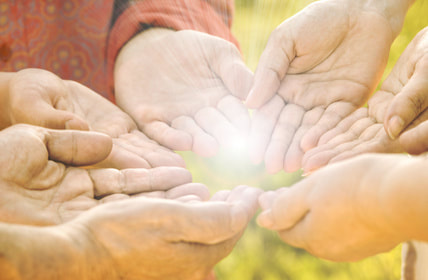|
Photo: TeresalaLoba I find myself saddened by actions some of my friends have taken that I had no control or influence over. And you know what? My friends probably have no idea their actions have had this effect on me. It’s not something they did to me or because of me. In fact, it had absolutely nothing to do with me. But it affected me greatly nonetheless. “No man is an island.” We’ve heard that saying many times, but often when we make choices, we forget that truth. We don’t weigh the consequences of our decisions and even our inactions on our friends and family. And why should we? We have to make our own choices and live with the consequences ourselves. We don’t take the time to assess how our actions might affect a friend or even an acquaintance. But should we? We’re connected in more ways than we realize. And some people are more sensitive than others. Whether we recognize it or not, the actions we take every day affect not only ourselves, but our loved ones too — and even those we don’t know. Think about your last drive on a freeway. Your trip was affected by strangers ahead of you, next to you, and even behind you. The same is true at the grocery store and many other places. What you do is more powerful than you know. People are watching you and influenced by you even when you don’t think they are. That means you have responsibility. What are you going to do with that? This week, I challenge you to be more intentional with your decisions. Remember, you’re not an island. Your actions have a ripple effect. What are you leaving in your wake?
0 Comments
Photo: Gerard Fritz I had a book signing at my cancer center last week, and no one showed up. I could have left extremely disappointed, but I didn’t. I enjoyed the time I had there chatting with the social worker. And I left more enriched because of it. Later in the week, I had a lunch date with a former co-worker. I hadn’t seen her in probably three months or longer. We picked right up where we left off and had a great conversation. I left there extremely encouraged. These encounters reminded me we need people in our lives. A popular Mandisa song says, “We all bleed the same. We’re more beautiful when we come together.” It’s about the humanity that unites each and every one of us. I recently heard someone say, “I’m an extroverted introvert or an introverted extrovert. I love people, but I need downtime to recharge.” I find myself in that same boat. I used to be a shy kid. I wouldn’t look people in the eye and certainly wouldn’t initiate a conversation. After seeing a television program about overcoming shyness, which stressed the importance of looking people in the eye, I made myself start to do that. It was hard and scary at first, but over time, it really helped. To the point that today I’m no longer afraid of people. (Of course, it helps that I have a few decades of life under my belt.) These days, I realize the importance of those around me. And I’m working at making them feel valued, just as I want to feel valued. The truth is they are valued — and I want them to know it. I’m enjoying spending time with people. Despite that enjoyment, I do need downtime away from people to recharge. And when I get that, I have more to give to those I encounter. It’s important to have balance. I don’t think it was a mistake that no one showed up at my book signing. I think maybe that social worker and I needed that one-on-one connection. Photo: Mandy A funny thing happened to me recently. I received an invitation to join Instragram, a social media site I hadn’t yet signed up for. I decided to give it a whirl to see what it was all about. So I created an account. And that’s it. That’s all I did. I didn’t upload a photo or share anything. To date, I have 51 followers. I’m flattered, really, that these people think I’m worth following — and that they’re willing to follow me without seeing any posts from me. But perhaps their willingness is partly because a lot of them are my friends on Facebook, so they’re following me on Instagram based on my reputation there. It’s good to be followed, but it’s big responsibility to lead. Following is easy. You can just go with the flow. But followers need something or someone to follow, so leading can be a big deal — and a huge undertaking. And risky. And scary. What if a leader wants to lead but isn’t followed? My husband and I have been binge-watching seasons of “Survivor,” and we see that time and time again: people who want to lead but aren’t followed. If no one’s following, it’s pretty tough to lead. What makes a leader worth following? There are many views on what makes a good leader. Different people have different ideas of the best characteristics. I believe an effective leader displays four main traits: 1. Reliability. A leader must be able to be trusted. He or she needs to be consistent so that followers know what to expect. Someone who is dependable easily gains the respect necessary to lead others. 2. Good communication. Followers don’t always like to be left in the dark. They like to feel valued, and one way to show them their value is through keeping them informed. Oftentimes, it’s better to overcommunicate than to undercommunicate. 3. Open-mindedness. A good leader knows his or her opinion isn’t the only opinion. To lead others who have different thoughts and perspectives requires an openness to the ways they see life. Just because they view things differently doesn’t mean they’re wrong. 4. Humility. Although confidence is an important leadership quality, no one wants to follow someone who’s egotistical and uses a position to his or her advantage. A leader who stays down to earth and approachable will have a truer, more appreciative following. Photo: NaamPhoto Everyone wants to fit in. We learn social cues early on. As young as preschool and kindergarten age, we want to have friends and know we have a place in this world. That longing is magnified in junior high school, when it becomes more important to fit in with one group or another. And it extends into high school, college, and even the workplace. But have you ever encountered someone who didn’t quite fit in? What did you do in that situation? I passed a gal in a hallway at work who had a scowl on her face. Her body language said, “Don’t talk to me. I’m having a bad day.” So, I said a silent prayer for her and left her alone. But the next time I passed her, that scowl remained. I like to smile at people I come across, so I flashed her one. She didn’t smile back. I decided to make it my goal to get her to smile. Every time I passed her, I smiled. Her scowl stayed plastered across her face. I found the gal at a company outing alone, scowl prominent. I decided this was my chance. I walked up to her, introduced myself, and started a conversation. I found out what department she works in, how long she’s been with the company, and that she likes her job. I also learned her name. And I’m happy to say that before the conversation ended, a smile made its way across her lips — which, of course, made me smile. I’ve bumped into her in the hallway at work since that encounter, and now I say hi and use her name when I see her. She responds, and the scowl, her seeming defense mechanism, dissipates. I don’t know her full story, but I like to believe she just wants to fit in. Made to Be Different I don’t think that sense of wanting to fit in ever goes away. It’s something we cling to, even in the workplace. We forget that each of us is unique and has a different set of skills and talents. And each of those different skills and talents is needed to complement the others and make a comprehensive, well-equipped team. Some people are better at giving presentations than others. They speak eloquently and are able to think quickly on their feet. Others are better behind the scenes, analyzing data and trends. Some are really good at engaging people. Others are better at handling tasks. Some shine with the written word. Others have a gift for numbers. Some excel at coming up with fresh ideas. Still others can think through the potential effects of those ideas and keep the visionaries grounded, balancing them out. The bottom line is we need each other. If we were all the same, this world would be a pretty boring place. We can each learn something from those who look, act, and think differently than we do. We don’t necessarily have to agree with them, but it doesn’t hurt to explore their perspectives. It actually stretches us and helps us grow. The next time you feel inadequate or inferior to those around you, remember they need you. You see the world differently, and that’s not a bad thing. You can open their eyes to new horizons. And the next time you see someone who looks like he or she doesn’t fit in, I hope you’ll reach out to that person and help him or her form a sense of belonging. You’ll be glad you did. |
Lana GatesChristian, wife, mother of 5, breast cancer survivor, marathon finisher, writer and editor, author of "Help! I'm a Science Project" Archives
November 2018
Categories |




 RSS Feed
RSS Feed